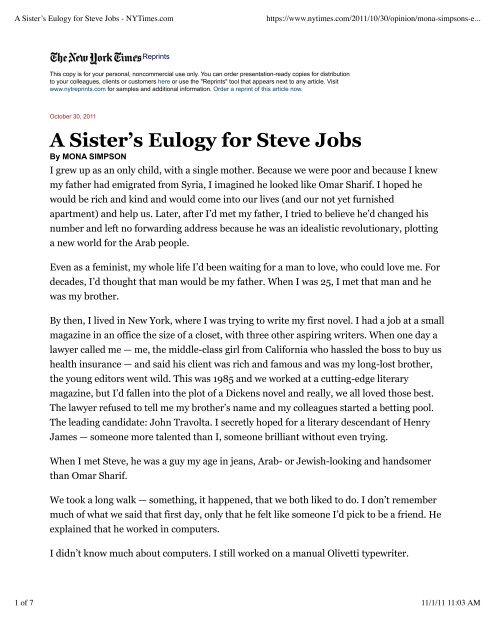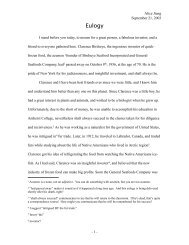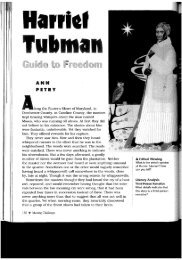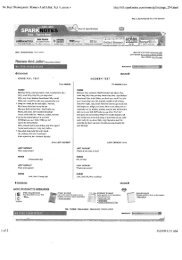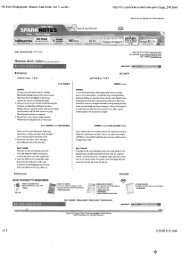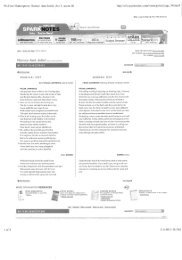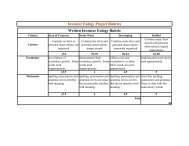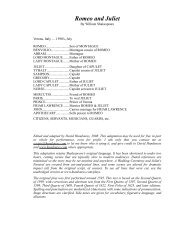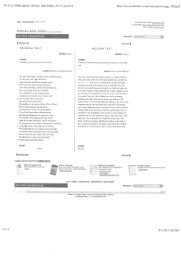A Sister's Eulogy for Steve Jobs - NYTimes.com - Mr. Boll
A Sister's Eulogy for Steve Jobs - NYTimes.com - Mr. Boll
A Sister's Eulogy for Steve Jobs - NYTimes.com - Mr. Boll
- No tags were found...
You also want an ePaper? Increase the reach of your titles
YUMPU automatically turns print PDFs into web optimized ePapers that Google loves.
A Sister’s <strong>Eulogy</strong> <strong>for</strong> <strong>Steve</strong> <strong>Jobs</strong> - <strong>NYTimes</strong>.<strong>com</strong>https://www.nytimes.<strong>com</strong>/2011/10/30/opinion/mona-simpsons-e...ReprintsThis copy is <strong>for</strong> your personal, non<strong>com</strong>mercial use only. You can order presentation-ready copies <strong>for</strong> distributionto your colleagues, clients or customers here or use the "Reprints" tool that appears next to any article. Visitwww.nytreprints.<strong>com</strong> <strong>for</strong> samples and additional in<strong>for</strong>mation. Order a reprint of this article now.October 30, 2011A Sister’s <strong>Eulogy</strong> <strong>for</strong> <strong>Steve</strong> <strong>Jobs</strong>By MONA SIMPSONI grew up as an only child, with a single mother. Because we were poor and because I knewmy father had emigrated from Syria, I imagined he looked like Omar Sharif. I hoped hewould be rich and kind and would <strong>com</strong>e into our lives (and our not yet furnishedapartment) and help us. Later, after I’d met my father, I tried to believe he’d changed hisnumber and left no <strong>for</strong>warding address because he was an idealistic revolutionary, plottinga new world <strong>for</strong> the Arab people.Even as a feminist, my whole life I’d been waiting <strong>for</strong> a man to love, who could love me. Fordecades, I’d thought that man would be my father. When I was 25, I met that man and hewas my brother.By then, I lived in New York, where I was trying to write my first novel. I had a job at a smallmagazine in an office the size of a closet, with three other aspiring writers. When one day alawyer called me — me, the middle-class girl from Cali<strong>for</strong>nia who hassled the boss to buy ushealth insurance — and said his client was rich and famous and was my long-lost brother,the young editors went wild. This was 1985 and we worked at a cutting-edge literarymagazine, but I’d fallen into the plot of a Dickens novel and really, we all loved those best.The lawyer refused to tell me my brother’s name and my colleagues started a betting pool.The leading candidate: John Travolta. I secretly hoped <strong>for</strong> a literary descendant of HenryJames — someone more talented than I, someone brilliant without even trying.When I met <strong>Steve</strong>, he was a guy my age in jeans, Arab- or Jewish-looking and handsomerthan Omar Sharif.We took a long walk — something, it happened, that we both liked to do. I don’t remembermuch of what we said that first day, only that he felt like someone I’d pick to be a friend. Heexplained that he worked in <strong>com</strong>puters.I didn’t know much about <strong>com</strong>puters. I still worked on a manual Olivetti typewriter.1 of 7 11/1/11 11:03 AM
A Sister’s <strong>Eulogy</strong> <strong>for</strong> <strong>Steve</strong> <strong>Jobs</strong> - <strong>NYTimes</strong>.<strong>com</strong>https://www.nytimes.<strong>com</strong>/2011/10/30/opinion/mona-simpsons-e...I told <strong>Steve</strong> I’d recently considered my first purchase of a <strong>com</strong>puter: something called theCromemco.<strong>Steve</strong> told me it was a good thing I’d waited. He said he was making something that wasgoing to be insanely beautiful.I want to tell you a few things I learned from <strong>Steve</strong>, during three distinct periods, over the27 years I knew him. They’re not periods of years, but of states of being. His full life. Hisillness. His dying.<strong>Steve</strong> worked at what he loved. He worked really hard. Every day.That’s incredibly simple, but true.He was the opposite of absent-minded.He was never embarrassed about working hard, even if the results were failures. If someoneas smart as <strong>Steve</strong> wasn’t ashamed to admit trying, maybe I didn’t have to be.When he got kicked out of Apple, things were painful. He told me about a dinner at which500 Silicon Valley leaders met the then-sitting president. <strong>Steve</strong> hadn’t been invited.He was hurt but he still went to work at Next. Every single day.Novelty was not <strong>Steve</strong>’s highest value. Beauty was.For an innovator, <strong>Steve</strong> was remarkably loyal. If he loved a shirt, he’d order 10 or 100 ofthem. In the Palo Alto house, there are probably enough black cotton turtlenecks <strong>for</strong>everyone in this church.He didn’t favor trends or gimmicks. He liked people his own age.His philosophy of aesthetics reminds me of a quote that went something like this: “Fashionis what seems beautiful now but looks ugly later; art can be ugly at first but it be<strong>com</strong>esbeautiful later.”<strong>Steve</strong> always aspired to make beautiful later.He was willing to be misunderstood.Uninvited to the ball, he drove the third or fourth iteration of his same black sports car to2 of 7 11/1/11 11:03 AM
A Sister’s <strong>Eulogy</strong> <strong>for</strong> <strong>Steve</strong> <strong>Jobs</strong> - <strong>NYTimes</strong>.<strong>com</strong>https://www.nytimes.<strong>com</strong>/2011/10/30/opinion/mona-simpsons-e...Next, where he and his team were quietly inventing the plat<strong>for</strong>m on which Tim Berners-Leewould write the program <strong>for</strong> the World Wide Web.<strong>Steve</strong> was like a girl in the amount of time he spent talking about love. Love was hissupreme virtue, his god of gods. He tracked and worried about the romantic lives of thepeople working with him.Whenever he saw a man he thought a woman might find dashing, he called out, “Hey areyou single? Do you wanna <strong>com</strong>e to dinner with my sister?”I remember when he phoned the day he met Laurene. “There’s this beautiful woman andshe’s really smart and she has this dog and I’m going to marry her.”When Reed was born, he began gushing and never stopped. He was a physical dad, witheach of his children. He fretted over Lisa’s boyfriends and Erin’s travel and skirt lengths andEve’s safety around the horses she adored.None of us who attended Reed’s graduation party will ever <strong>for</strong>get the scene of Reed and<strong>Steve</strong> slow dancing.His abiding love <strong>for</strong> Laurene sustained him. He believed that love happened all the time,everywhere. In that most important way, <strong>Steve</strong> was never ironic, never cynical, neverpessimistic. I try to learn from that, still.<strong>Steve</strong> had been successful at a young age, and he felt that had isolated him. Most of thechoices he made from the time I knew him were designed to dissolve the walls around him.A middle-class boy from Los Altos, he fell in love with a middle-class girl from New Jersey.It was important to both of them to raise Lisa, Reed, Erin and Eve as grounded, normalchildren. Their house didn’t intimidate with art or polish; in fact, <strong>for</strong> many of the first yearsI knew <strong>Steve</strong> and Lo together, dinner was served on the grass, and sometimes consisted ofjust one vegetable. Lots of that one vegetable. But one. Broccoli. In season. Simply prepared.With just the right, recently snipped, herb.Even as a young millionaire, <strong>Steve</strong> always picked me up at the airport. He’d be standingthere in his jeans.When a family member called him at work, his secretary Linetta answered, “Your dad’s in ameeting. Would you like me to interrupt him?”When Reed insisted on dressing up as a witch every Halloween, <strong>Steve</strong>, Laurene, Erin and3 of 7 11/1/11 11:03 AM
A Sister’s <strong>Eulogy</strong> <strong>for</strong> <strong>Steve</strong> <strong>Jobs</strong> - <strong>NYTimes</strong>.<strong>com</strong>https://www.nytimes.<strong>com</strong>/2011/10/30/opinion/mona-simpsons-e...Eve all went wiccan.They once embarked on a kitchen remodel; it took years. They cooked on a hotplate in thegarage. The Pixar building, under construction during the same period, finished in half thetime. And that was it <strong>for</strong> the Palo Alto house. The bathrooms stayed old. But — and this wasa crucial distinction — it had been a great house to start with; <strong>Steve</strong> saw to that.This is not to say that he didn’t enjoy his success: he enjoyed his success a lot, just minus afew zeros. He told me how much he loved going to the Palo Alto bike store and gleefullyrealizing he could af<strong>for</strong>d to buy the best bike there.And he did.<strong>Steve</strong> was humble. <strong>Steve</strong> liked to keep learning.Once, he told me if he’d grown up differently, he might have be<strong>com</strong>e a mathematician. Hespoke reverently about colleges and loved walking around the Stan<strong>for</strong>d campus. In the lastyear of his life, he studied a book of paintings by Mark Rothko, an artist he hadn’t knownabout be<strong>for</strong>e, thinking of what could inspire people on the walls of a future Apple campus.<strong>Steve</strong> cultivated whimsy. What other C.E.O. knows the history of English and Chinese tearoses and has a favorite David Austin rose?He had surprises tucked in all his pockets. I’ll venture that Laurene will discover treats —songs he loved, a poem he cut out and put in a drawer — even after 20 years of anexceptionally close marriage. I spoke to him every other day or so, but when I opened TheNew York Times and saw a feature on the <strong>com</strong>pany’s patents, I was still surprised anddelighted to see a sketch <strong>for</strong> a perfect staircase.With his four children, with his wife, with all of us, <strong>Steve</strong> had a lot of fun.He treasured happiness.Then, <strong>Steve</strong> became ill and we watched his life <strong>com</strong>press into a smaller circle. Once, he’dloved walking through Paris. He’d discovered a small handmade soba shop in Kyoto. Hedownhill skied gracefully. He cross-country skied clumsily. No more.Eventually, even ordinary pleasures, like a good peach, no longer appealed to him.Yet, what amazed me, and what I learned from his illness, was how much was still left after4 of 7 11/1/11 11:03 AM
A Sister’s <strong>Eulogy</strong> <strong>for</strong> <strong>Steve</strong> <strong>Jobs</strong> - <strong>NYTimes</strong>.<strong>com</strong>https://www.nytimes.<strong>com</strong>/2011/10/30/opinion/mona-simpsons-e...so much had been taken away.I remember my brother learning to walk again, with a chair. After his liver transplant, oncea day he would get up on legs that seemed too thin to bear him, arms pitched to the chairback. He’d push that chair down the Memphis hospital corridor towards the nursing stationand then he’d sit down on the chair, rest, turn around and walk back again. He counted hissteps and, each day, pressed a little farther.Laurene got down on her knees and looked into his eyes.“You can do this, <strong>Steve</strong>,” she said. His eyes widened. His lips pressed into each other.He tried. He always, always tried, and always with love at the core of that ef<strong>for</strong>t. He was anintensely emotional man.I realized during that terrifying time that <strong>Steve</strong> was not enduring the pain <strong>for</strong> himself. Heset destinations: his son Reed’s graduation from high school, his daughter Erin’s trip toKyoto, the launching of a boat he was building on which he planned to take his familyaround the world and where he hoped he and Laurene would someday retire.Even ill, his taste, his discrimination and his judgment held. He went through 67 nursesbe<strong>for</strong>e finding kindred spirits and then he <strong>com</strong>pletely trusted the three who stayed with himto the end. Tracy. Arturo. Elham.One time when <strong>Steve</strong> had contracted a tenacious pneumonia his doctor <strong>for</strong>bid everything —even ice. We were in a standard I.C.U. unit. <strong>Steve</strong>, who generally disliked cutting in line ordropping his own name, confessed that this once, he’d like to be treated a little specially.I told him: <strong>Steve</strong>, this is special treatment.He leaned over to me, and said: “I want it to be a little more special.”Intubated, when he couldn’t talk, he asked <strong>for</strong> a notepad. He sketched devices to hold aniPad in a hospital bed. He designed new fluid monitors and x-ray equipment. He redrewthat not-quite-special-enough hospital unit. And every time his wife walked into the room, Iwatched his smile remake itself on his face.For the really big, big things, you have to trust me, he wrote on his sketchpad. He looked up.You have to.5 of 7 11/1/11 11:03 AM
A Sister’s <strong>Eulogy</strong> <strong>for</strong> <strong>Steve</strong> <strong>Jobs</strong> - <strong>NYTimes</strong>.<strong>com</strong>https://www.nytimes.<strong>com</strong>/2011/10/30/opinion/mona-simpsons-e...By that, he meant that we should disobey the doctors and give him a piece of ice.None of us knows <strong>for</strong> certain how long we’ll be here. On <strong>Steve</strong>’s better days, even in the lastyear, he embarked upon projects and elicited promises from his friends at Apple to finishthem. Some boat builders in the Netherlands have a gorgeous stainless steel hull ready to becovered with the finishing wood. His three daughters remain unmarried, his two youngeststill girls, and he’d wanted to walk them down the aisle as he’d walked me the day of mywedding.We all — in the end — die in medias res. In the middle of a story. Of many stories.I suppose it’s not quite accurate to call the death of someone who lived with cancer <strong>for</strong> yearsunexpected, but <strong>Steve</strong>’s death was unexpected <strong>for</strong> us.What I learned from my brother’s death was that character is essential: What he was, washow he died.Tuesday morning, he called me to ask me to hurry up to Palo Alto. His tone wasaffectionate, dear, loving, but like someone whose luggage was already strapped onto thevehicle, who was already on the beginning of his journey, even as he was sorry, truly deeplysorry, to be leaving us.He started his farewell and I stopped him. I said, “Wait. I’m <strong>com</strong>ing. I’m in a taxi to theairport. I’ll be there.”“I’m telling you now because I’m afraid you won’t make it on time, honey.”When I arrived, he and his Laurene were joking together like partners who’d lived andworked together every day of their lives. He looked into his children’s eyes as if he couldn’tunlock his gaze.Until about 2 in the afternoon, his wife could rouse him, to talk to his friends from Apple.Then, after awhile, it was clear that he would no longer wake to us.His breathing changed. It became severe, deliberate, purposeful. I could feel him countinghis steps again, pushing farther than be<strong>for</strong>e.This is what I learned: he was working at this, too. Death didn’t happen to <strong>Steve</strong>, heachieved it.6 of 7 11/1/11 11:03 AM
A Sister’s <strong>Eulogy</strong> <strong>for</strong> <strong>Steve</strong> <strong>Jobs</strong> - <strong>NYTimes</strong>.<strong>com</strong>https://www.nytimes.<strong>com</strong>/2011/10/30/opinion/mona-simpsons-e...He told me, when he was saying goodbye and telling me he was sorry, so sorry we wouldn’tbe able to be old together as we’d always planned, that he was going to a better place.Dr. Fischer gave him a 50/50 chance of making it through the night.He made it through the night, Laurene next to him on the bed sometimes jerked up whenthere was a longer pause between his breaths. She and I looked at each other, then he wouldheave a deep breath and begin again.This had to be done. Even now, he had a stern, still handsome profile, the profile of anabsolutist, a romantic. His breath indicated an arduous journey, some steep path, altitude.He seemed to be climbing.But with that will, that work ethic, that strength, there was also sweet <strong>Steve</strong>’s capacity <strong>for</strong>wonderment, the artist’s belief in the ideal, the still more beautiful later.<strong>Steve</strong>’s final words, hours earlier, were monosyllables, repeated three times.Be<strong>for</strong>e embarking, he’d looked at his sister Patty, then <strong>for</strong> a long time at his children, then athis life’s partner, Laurene, and then over their shoulders past them.<strong>Steve</strong>’s final words were:OH WOW. OH WOW. OH WOW.Mona Simpson is a novelist and a professor of English at the University of Cali<strong>for</strong>nia, LosAngeles. She delivered this eulogy <strong>for</strong> her brother, <strong>Steve</strong> <strong>Jobs</strong>, on Oct. 16 at his memorial serviceat the Memorial Church of Stan<strong>for</strong>d University.7 of 7 11/1/11 11:03 AM


